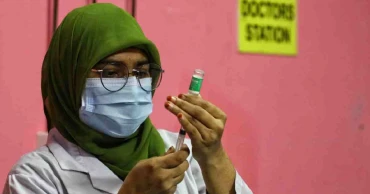vaccination campaign
7-day Covid-19 vaccination campaign kicks off Thursday
The government will launch another seven-day special vaccination campaign against Covid-19 from Thursday.
This campaign will send on December 7, Dr Shamsul Haque, director of the vaccination program of the Directorate General of Health Services (DGHS), told reporters on Wednesday.
Read more: COVID-19: US vaccine donations to Bangladesh exceed 100 million
Around 90 lakh people will be vaccinated under this campaign where 17,116 teams will provide the service, he added.
Meanwhile, the National Technical Advisory Committee (NTAC) on Covid-19 has recommended administering the fourth dose of Covid vaccine to contain the further spread of the virus, said Dr Shamsul Haque.
It recommended bringing front liners, citizens aged above 60 and the pregnant women under the fourth dose vaccination progamme in the first phase, he said.
Read more: JS body for quick completion of vaccine manufacturing plant work in Gopalganj
So far, 87 percent of the total population, including children, have received the first dose in the country while 73 percent the second dose, he added.
3 years ago
7-day Covid vaccination campaign from Dec 1 marking Victory Day
The government will launch another special vaccination campaign against Covid-19, marking the country’s Victory Day, said the Health Minister Zahid Maleque on Tuesday.
The campaign will start from December 1 and end on December 7, he said in an event marking World Antibacterial Week at a city hotel.
Read more: COVID-19: US vaccine donations to Bangladesh exceed 100 million
Around 90 lakh people will be vaccinated under this campaign, he added.
“We have been successful in our previous campaigns. Hopefully this one will be successful too,” said the minister.
Read more: Campaign for 1st, 2nd doses of Covid vaccine to continue till Oct 8: DGHS
So far, 14.69 crore people have been vaccinated with the first dose while more than 12 crore people with the second dose against Covid-19, he added.
3 years ago
After slow starts, some Asian vaccination rates now soaring
When Cambodia rolled out COVID-19 vaccines, lines stretched down entire streets and people left their shoes out to save their places as they sheltered from the sun. But three months into its campaign, just 11% of the population had received at least one dose. In far wealthier Japan, it took two weeks longer to reach that level.
Now both countries boast vaccination rates that rank among the world's best. They are two of several nations in the Asia-Pacific region that got slow starts to their immunization campaigns but have since zoomed past the United States and many nations in Europe.
The countries with high rates include both richer and poorer ones, some with larger populations and some with smaller. But all have experience with infectious diseases, like SARS, and strong vaccine-procurement programs, many of which knew to spread their risk by ordering from multiple manufacturers.
Also read: US mandates vaccines or tests for big companies by Jan. 4
Most started vaccinating relatively late due to complacency amid low infection rates, initial supply issues and other factors. But by the time they did, soaring death tolls in the United States, Britain and India helped persuade even the skeptical to embrace the efforts.
“I did worry, but at the moment we are living under the threat of COVID-19. There is no option but to be vaccinated,” said Rath Sreymom, who rushed to get her daughter, 5-year-old Nuth Nyra, a shot once Cambodia opened its program to her age group this month.
Cambodia was one of the earlier countries in the region to start its vaccination program with a Feb. 10 launch — still two months after the United States and Britain began theirs. As elsewhere in the region, the rollout was slow, and by early May, as the delta variant started to spread rapidly, only 11% of its 16 million people had gotten at least their first shot, according to Our World in Data. That's about half the rate reached in the United States during the same timeframe and a third of the U.K.’s.
Today Cambodia is 78% fully vaccinated — compared to 58% in the U.S. It is now offering booster shots and looking at extending its program to 3- and 4-year-olds.
From the beginning, it has seen strong demand for the vaccine, with the rollout to the general public in April coinciding with a massive surge of cases in India, from which grim images emerged of pyres of bodies outside overwhelmed crematoria.
Also read: Indonesia first to greenlight Novavax COVID-19 vaccine
Prime Minister Hun Sen leveraged his close ties with Beijing to procure nearly 37 million doses from China, some of which were donated. He declared last week that Cambodia's “victory of vaccination” could not have happened without them. The country also received large donations from the U.S., Japan, Britain and from the international COVAX program.
Still, it took time to get sufficient supplies, and many countries in the region that started their programs later struggled even more, especially when the region’s major producer, India, suspended vaccine exports during its spring surge.
“Certainly getting the supply in place was really important for the countries that have done particularly well,” said John Fleming, the Asia-Pacific head of health for the Red Cross. “Then there’s the demand creation side — clearly this is about getting a buy-in from the population and also reaching out to marginalized groups.”
Early in the pandemic, many Asian countries imposed strict lockdown and travel rules that kept the virus largely at bay. As vaccines rolled out in force elsewhere, those low rates sometimes worked against them, giving some people the impression that getting the shot wasn't urgent.
But when the virulent delta variant began ripping through the region, cases rose, encouraging people to sign up.
Some countries, like Malaysia, made extra efforts to ensure that even the hardest-to-reach groups were offered the vaccine. It enlisted the Red Cross’s help to give shots to people living in the country illegally and other groups that may have feared showing up for a government-sponsored vaccination.
“We made the vaccine accessible to all, with no questions asked,” said Professor Sazaly Abu Bakar, director of the Tropical Infectious Diseases and Research Education Center.
As with Cambodia and Japan, Malaysia plodded along in its first three months, giving less than 5% of its 33 million people their first dose in that time, according to Our World in Data.
When cases surged, however, Malaysia bought more doses and established hundreds of vaccination centers, including mega hubs capable of providing up to 10,000 shots a day. The country now has 76% of its population fully vaccinated.
To date, about a dozen countries in the Asia-Pacific region have vaccinated more than 70% of their populations or are on the cusp of doing so, including Australia, China, Japan and Bhutan. In Singapore, 92% are fully vaccinated.
Some countries in Asia, however, have continued to struggle. India celebrated giving its billionth COVID-19 vaccine dose in October, but with a population of nearly 1.4 billion, that translates to a fully vaccinated rate of 29%. Indonesia started earlier than most but has also stumbled, largely due to the challenge of expanding its campaign across the thousands of islands that make up its archipelago.
Japan's vaccine program was notoriously slow — inching along while the world wondered if it would be able to hold the Summer Olympics. It didn't start until mid-February because it required additional clinical testing on Japanese people before using the vaccines — a move that was widely criticized as unnecessary. It was also initially hit with supply issues.
But then it turned a corner. Then-Prime Minister Yoshihide Suga brought in military medial staff to operate mass inoculation centers in Tokyo and Osaka and bent laws to allow dentists, paramedics and lab technicians to give shots alongside doctors and nurses.
The number of daily doses given rose to about 1.5 million in July, and the country is now at about 76% fully inoculated. A large part of Japan's success is due to the public's response, said Makoto Shimoaraiso, a senior official in charge of the country's COVID-19 response.
Many in Japan are skeptical in general about vaccines, but after seeing deaths soar around the world, it has not been an issue.
In fact, retiree Kiyoshi Goto is already clamoring for his next shot, as he looks warily at rising case in Europe.
“I want to get a booster shot as our antibody levels are going down,” the 75-year-old said.
In Phnom Penh, Nuth Nyra was just happy to get her first, saying she was afraid of COVID-19 before — but no more.
“I felt a little bit of pain when I got the shot,” the young girl said in a soft voice at a vaccination center on the outskirts of Cambodia's capital. “But I didn’t cry.”
4 years ago
Global Covid cases near 250 million
Although Covid-19 cases around the world are declining the overall number of cases is approaching 250 million as the virus is still infecting people.
According to Johns Hopkins University (JHU), the total case count mounted to 249,849,645 while the death toll from the virus reached 5,048,854, as of Monday morning.
The US has recorded 46,487,740 cases to date and more than 754,429 people have died so far from the virus in the country, as per the university data.
In the US, winter is coming and diseases like Covid-19 often spread easier with people indoors and closer together. The worst surge in the nation happened last winter, before the vaccines were widely available, reports AP.
Read: Fuel price hike a fresh blow to Covid-hit economy: Experts
While cases around the world are declining, the World Health Organization said this week new cases jumped by 6% in Europe, compared with an 18% increase the previous week.
The number of Americans in the hospital with Covid-19 is averaging around 42,000, the lowest number since the beginning of August, according to the Centers for Disease Control and Prevention.
But deaths, which lag behind increasing case counts because it can take weeks for the disease to kill, continue to mount. The US is averaging 1,100 coronavirus deaths per day, down from more than 1,600 two weeks ago.
Brazil, which has been experiencing a new wave of cases since January, registered 21,880,439 cases as of Monday, while its Covid death toll rose to 609,447.
India's COVID-19 tally rose to 34,355,536 on Sunday, as 10,853 new cases were registered during the past 24 hours across the country, showed the federal health ministry's latest data.
Besides, 526 deaths due to the pandemic since Saturday morning took the total death toll to 460,791.
Russia registered 39,165 COVID-19 infections over the past 24 hours, taking the national tally to 8,795,095, the official monitoring and response center said Sunday.
The national death toll grew by 1,179 to 246,814 and the number of recoveries increased by 26,806 to 7,561,978.
Situation in Bangladesh
Bangladesh logged four more Covid-linked deaths and reported 178 fresh infections in 24 hours till Sunday morning.
On Saturday, the country saw just a single death from Covid-19 which was the lowest in nearly 18 months along with 154 cases.
The fresh numbers took the total fatalities to 27,895 while the country’s caseload mounted to 1,571,013, said the Directorate General of Health Services (DGHS).
Read: Bangladesh records single Covid-linked death in 24 hrs
Three of the deceased were men and one was a woman.
Meanwhile, the daily-case positivity rate slightly declined to 1.17 per cent from Saturday’s 1.18 per cent.
However, the mortality rate remained static at 1.78 per cent.
The fresh cases were detected after testing 15, 234 samples, said the DGHS.
Also, the recovery rate remained unchanged at 97.70 per cent with the recovery of 190 more patients during the period.
So far, 3,12,88,572 people have fully been vaccinated in the country while 4,55,91,130 received the first dose as of Sunday, according to the DGHS.
4 years ago
Vaccination campaign for school children kicks off in Dhaka centres
The campaign to vaccinate the school students of the 12-17 age group against Covid-19 began in Dhaka on Monday.
Health Minister Zahid Maleque and Education Minister Dipu Moni inaugurated the vaccination campaign at Motijheel Ideal School and College while the drives in other centres in the city will start on Tuesday.
The vaccination campaign will be conducted at eight centres in the capital although it was scheduled to begin at 12 centres in the city. Other centres did not get approval due to lack of adequate facilities.
The seven other schools are: Hurdco International School, South Point School and College, Chittagong Grammar School, Dhaka, Mirpur Commerce College, Kakoli High School and College, South Bridge School and Scholastica School.
Read: Japan to provide more vaccine doses through COVAX in Nov
4 years ago
US ambassador hands over 2.5 million Pfizer vaccine doses to Bangladesh
US Ambassador to Bangladesh Earl R. Miller has handed over a donation of 2.5 million doses of Pfizer’s COVID-19 vaccine to Bangladesh, a gift from the American people.
The Pfizer vaccines build on earlier US COVID-19 vaccine donations for a total of 11.5 million doses donated by the U.S. government and the American people.
Read:Dhaka to receive 25 lakh more Pfizer vaccine doses Ambassador Miller and the U.S. Agency for International Development (USAID) Mission Director Kathryn Stevens handed over the vaccine donation to Additional Secretary of the Ministry of Health and Family Welfare Syed Mojibul Huq and Director General at the Directorate General of Health Services (DGHS) Professor Dr. Abul Bashar Mohammad Khurshid Alam during a ceremonial handover event at the Expanded Programme on Immunization (EPI) headquarters in the city on Tuesday. “The United States is pleased to donate these additional 2.5 million doses of life-saving Pfizer vaccine to Bangladesh and continue our support to the national vaccination campaign. We are also proud to support the global COVAX vaccine initiative to make sure the proper infrastructure is in place to store and administer these Pfizer vaccines safely and effectively,” said Ambassador Miller. The U.S. government and Government of Bangladesh officials also toured the EPI COVID-19 vaccine storage facility where Pfizer doses are being stored in 26 ultra-cold freezers supplied through the global COVAX vaccine alliance partnership.
4 years ago
DU ready to roll out its vaccination drive Monday
Dhaka University, the country’s oldest university, will launch its vaccination campaign on Monday at its medical centre, aiming to vaccinate its teachers, students and staff.
The university has already turned its Martyred Intellectual Dr Muhammad Murtaza Medical Centre into a temporary vaccination centre.
Officials said the campaign will be inaugurated at 9:30am and run till October 17 with Sinopharm vaccine jabs.
The vaccine seekers must bring their national identity cards (NIDs) or DU IDs to complete the on-the-spot registration.
The drive for the second dose was scheduled to begin on November 1.
Those who have already registered to receive the Covid-19 vaccine at centres under Dhaka South City Corporation (DSCC), such as Dhaka Medical College Hospital, BSMMU, and Sheikh Hasina National Burn and Plastic Surgery Institute, may take the vaccine at the DU if they are yet to be vaccinated with any of the doses.
Read: Hasina’s birthday celebrated amid mass vaccination campaign
4 years ago
Mismanagement, politicization made vaccination drive a complete mess: BNP
BNP Secretary General Mirza Fakhrul Islam Alamgir on Sunday alleged that the government has politicised the mass vaccination programme by deceiving the common people.
"Our standing committee thinks the government has indulged in mass deception in the name of mass vaccination without collecting enough vaccine doses. The mass vaccination campaign has become a drive to spread mass infection due to extreme mismanagement and politicisation,” he said.
Fakhrul came up with the remarks while unveiling the decisions of a virtual meeting of BNP standing committee at a press conference at the party chairperson’s Gulshan office. The meeting was held on Saturday evening.
Also read: Covid mortality rate high for lack of treatment: BNP
He said their party policymakers urged the government to take effective measures to ensure general vaccination coming out of the process of ‘politicisation’. “We strongly condemn and protest the involvement of ruling party workers in the mass vaccination programme.”
4 years ago
Covid-19: Bangladesh records 88 deaths, 3629 new cases
Bangladesh recorded 88 coronavirus-related deaths in the last 24 hours until Friday morning as the country grapples to tackle the second wave of the virus.
The health authorities also reported 3,629 new cases, said the Directorate General of Health Services in a handout.
The coronavirus death toll now stands at 10,869 with the mortality rate slightly rising to 1.47 percent after staying at 1.46 for the last two days.
Meanwhile, the daily infection rate fell to 14 percent from Thursday’s 14.63 percent.
Between April 16 and 19, the country recorded over 100 deaths breaking previous daily records. Bangladesh saw 91, 95 and 98 Covid-related deaths on April 20, 21 and 22 respectively.
Bangladesh reported its first coronavirus cases on March 8 last year and the first death on the 18th of that month.
Also read: Covid-19: Bangladesh sees 98 more deaths, 4014 new infections
Health authorities have so far confirmed 739,703 cases. Among them, 647,674 people - 87.56 percent of all patients – have recovered.
4 years ago
Half of US adults have received at least one COVID-19 shot
Half of all adults in the U.S. have received at least one COVID-19 shot, the government announced Sunday, marking another milestone in the nation’s largest-ever vaccination campaign but leaving more work to do to convince skeptical Americans to roll up their sleeves.
Almost 130 million people 18 or older have received at least one dose of a vaccine, or 50.4% of the total adult population, the Centers for Disease Control and Prevention reported. Almost 84 million adults, or about 32.5% of the population, have been fully vaccinated.
Also Read: Vaccines to be made available at Alaska airports
The U.S. cleared the 50% mark just a day after the reported global death toll from the coronavirus topped a staggering 3 million, according to totals compiled by Johns Hopkins University, though the actual number is believed to be significantly higher.
The country’s vaccination rate, at 61.6 doses administered per 100 people, currently falls behind Israel, which leads among countries with at least 5 million people with a rate of 119.2. The U.S. also trails the United Arab Emirates, Chile and the United Kingdom, which is vaccinating at a rate of 62 doses per 100 people, according to Our World in Data, an online research site.
The vaccine campaign offered hope in places like Nashville, Tennessee, where the Music City Center bustled Sunday with vaccine seekers. High demand for appointment-only shots at the convention center has leveled off enough that walk-ins will be welcome starting this week.
Read South Africa scraps AstraZeneca vaccine, will give J&J jabs
Amanda Grimsley, who received her second shot, said she’s ready to see her 96-year-old grandmother, who lives in Alabama and has been nervous about getting the vaccine after having a bad reaction to a flu shot.
“It’s a little emotional. I haven’t been able to see my grandmother in a year and a half almost,” said Grimsley, 35. “And that’s the longest my entire family has ever gone without seeing her. And we’ll be seeing her in mid-May now.”
The states with the highest vaccination rates have a history of voting Democratic and supporting President Joe Biden in the 2020 election: New Hampshire at the top, with 71.1%, followed by New Mexico, Connecticut, Massachusetts and Maine, CDC data show.
Also Read: A rapid COVID-19 vaccine rollout backfired in some US states
The demand has not been the same in many areas of Tennessee — particularly, rural ones.
Tennessee sits in the bottom four states for rates of adults getting at least one shot, at 40.8%. It’s trailed only by Louisiana, Alabama and Mississippi — three other Southern states that lean Republican and voted for Donald Trump last fall.
Vaccination rates do not always align with how states vote. But polling from The Associated Press-NORC Center for Public Affairs Research has shown trends that link political leanings and attitudes about the vaccines and other issues related to the pandemic, which has killed more than 566,000 people in the U.S.
A poll conducted in late March found that 36% of Republicans said they will probably or definitely not get vaccinated, compared with 12% of Democrats. Similarly, a third of rural Americans said they were leaning against getting shots, while fewer than a fourth of people living in cities and suburbs shared that hesitancy.
Read Ghana is first nation in world to receive COVAX vaccines
Overall, willingness to get vaccinated has risen, polling shows.
In January, 67% of adult Americans were willing to get vaccinated or had already received at least one shot. The figure has climbed to 75%, according to the latest AP-NORC poll.
Nationwide, 24% of Black Americans and 22% of Hispanic Americans say they will probably or definitely not get vaccinated, down from 41% and 34% in January, respectively. Among white Americans, 26% now say they will not get vaccinated. In January, that number was 31%.
Dr. Anthony Fauci, the nation’s top infectious disease expert, said the goal is to get community figures, from athletes to clergy, to encourage vaccinations, particularly as the seven-day national average of cases remains over 60,000 new infections per day.
Read Coronavirus vaccines: How’s my country and the rest of the world doing?
“What we are doing is we’re trying to get, by a community core, trusted messages that anyone would feel comfortable with listening to, whether you’re a Republican, a Democrat, an independent or whomever you are, that you’re comfortable,” Fauci said Sunday on ABC’s “This Week.”
Fauci also indicated Sunday that the government will likely move to resume use of Johnson & Johnson’s COVID-19 vaccine this week, possibly with restrictions or broader warnings after reports of some very rare blood clot cases.
In a series of news show interviews, Fauci said he expects a decision when advisers to the CDC meet Friday to discuss the pause in J&J’s single-dose vaccine.
Read Japan begins COVID-19 vaccination drive amid supply worry
“I would be very surprised if we don’t have a resumption in some form by Friday,” he said. “I don’t really anticipate that they’re going to want it stretch it out a bit longer.”
Fauci, who is President Joe Biden’s chief medical adviser, said he believed federal regulators could bring the shots back with limits based on age or gender, or with a blanket warning, so the vaccine is administered in a way “a little bit different than we were before the pause.”
The J&J vaccine was thrown into limbo after the CDC and the Food and Drug Administration said last week that they needed more evidence to decide if a handful of unusual blood clots were linked to the shot — and if so, how big the risk is.
The reports are rare — six cases out of more than 7 million U.S. inoculations with the J&J vaccine. The clots were found in women between the ages of 18 and 48. One person died.
Read J&J vaccine to remain in limbo while officials seek evidence
4 years ago




.jpg)
.jpg)
.jpg)
.png)





